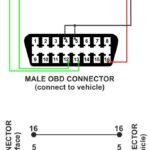Modern vehicles are complex machines, relying heavily on sophisticated computer systems to manage everything from engine performance to safety features. When something goes wrong, understanding the issue quickly and accurately is crucial. This is where Diagnostic Tools For All Cars become indispensable. These tools act as a vital bridge between mechanics and the intricate electronics of today’s automobiles, providing the insights needed for efficient and effective repairs.
A car diagnostic tool works by communicating with your vehicle’s on-board computer system. This interaction allows the tool to gather a wealth of information about the vehicle’s operational status and overall health. By reading fault codes, monitoring real-time sensor data, and performing a variety of system tests, these tools can pinpoint problems within the engine, transmission, emissions controls, braking system, and numerous other critical components. This precise diagnostic capability empowers technicians and even car owners to accurately identify issues and undertake the necessary repairs.
What kinds of diagnostic tools for all cars are available? The market offers a range of tools, each with different capabilities and price points to suit various needs and levels of expertise:
Basic Code Readers: For those looking for a straightforward solution, code readers are an entry-level option. These tools are designed to perform the fundamental task of reading and clearing diagnostic trouble codes (DTCs). While they are generally the most affordable type of diagnostic tool, their functionality is limited to basic code reading and clearing, lacking more advanced diagnostic features.
OBD2 Scanners: OBD2 scanners represent a step up in capability and are among the most popular diagnostic tools for all cars. These handheld devices connect to the standardized OBD2 port found in most modern vehicles, typically located beneath the dashboard. OBD2 scanners not only read and clear DTCs but also offer the ability to view live data streams from vehicle sensors. This real-time data feed allows for a more dynamic understanding of vehicle performance and can aid in diagnosing intermittent issues. Many OBD2 scanners also include additional functions such as freeze frame data (snapshots of sensor readings when a fault code was triggered) and emissions readiness testing.
Multimeters: While not exclusively car diagnostic tools, multimeters are essential for electrical system diagnosis in any vehicle. These versatile tools measure electrical parameters like voltage, current, and resistance. In automotive contexts, multimeters are invaluable for troubleshooting problems within the electrical circuits and components of a vehicle. This includes testing sensors, switches, wiring harnesses, and other electrical elements to identify shorts, open circuits, or incorrect signal levels. Their ability to precisely measure electrical values makes them a crucial instrument for any comprehensive automotive diagnostic process, especially when dealing with electrical faults that may not always trigger diagnostic trouble codes.
Professional Diagnostic Scanners: At the higher end of the spectrum are professional diagnostic scanners. These are sophisticated, often tablet-based systems used by professional mechanics and automotive technicians. Professional scanners offer the most comprehensive diagnostic capabilities, going far beyond basic code reading and live data. They typically include advanced features such as:
- Bi-directional control: This allows technicians to send commands to vehicle systems to test components like actuators, relays, and solenoids.
- System-specific diagnostics: Deeper access to individual vehicle systems beyond the standardized OBD2 protocols, including ABS, SRS, transmission, and more.
- Advanced coding and programming: Capabilities to program new modules, perform adaptations after component replacement, and customize vehicle settings.
- Extensive vehicle coverage: Support for a wide range of vehicle makes and models, often including older and specialty vehicles.
- Detailed repair information: Integration with repair databases, wiring diagrams, and troubleshooting guides.
These advanced diagnostic tools for all cars are designed to provide in-depth analysis and facilitate complex repairs, making them indispensable for automotive service professionals.
Choosing the right diagnostic tool for all cars depends on your specific needs and expertise. For basic maintenance and simple code reading, a code reader or basic OBD2 scanner may suffice. However, for more in-depth diagnostics, troubleshooting complex issues, or professional automotive repair work, a more advanced OBD2 scanner or a professional-grade diagnostic tool is necessary. Understanding the different types of diagnostic tools available and their respective capabilities will ensure you select the most effective tool for maintaining and repairing your vehicle, or for your automotive business.

